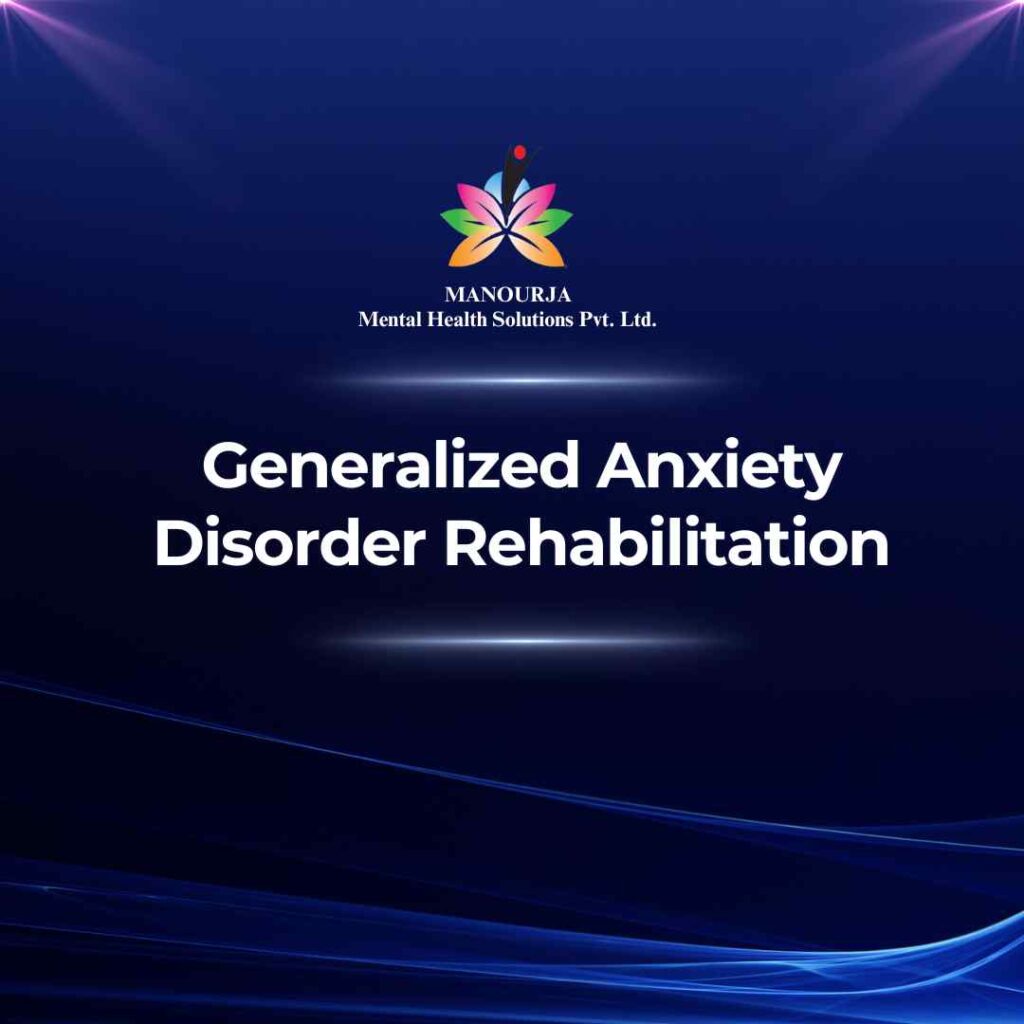Generalized Anxiety Disorder Rehabilitation

Generalized Anxiety Disorder (GAD) is characterized by excessive, uncontrollable worry about everyday issues, which is disproportionate to the actual source of worry. This can lead to a variety of emotional and physical symptoms and significantly impair an individual’s daily functioning. Understanding these symptoms and deciding the appropriate level of care—outpatient (OPD) or inpatient (IPD) psychosocial rehabilitation—is essential for effective management and recovery.
Signs and Symptoms of Generalized Anxiety Disorder
Key indicators that family members and individuals should be aware of include:
- Persistent Worrying: Worrying excessively about various activities or events, more often than not.
- Restlessness: Feeling on edge or restless and often being unable to relax.
- Difficulty Concentrating: Trouble focusing or mind going blank frequently.
- Fatigue: Feeling tired most of the day or experiencing unexplained fatigue.
- Irritability: Becoming easily annoyed or irritable.
- Muscle Tension: Persistent muscle tension that is not related to physical activity.
- Sleep Disturbance: Problems falling asleep, staying asleep, or unsatisfying sleep.
Indicators for OPD vs. IPD Psychosocial Rehabilitation
Outpatient (OPD) Psychosocial Rehabilitation
- Suitable for individuals who experience mild to moderate symptoms of anxiety that can be managed while they continue their regular daily activities.
- Effective when the individual has a supportive home environment that can facilitate the recovery process.
- Appropriate for individuals who are able to maintain some level of functioning and do not exhibit suicidal tendencies or severe depression.
Inpatient (IPD) Psychosocial Rehabilitation
- Necessary for individuals whose symptoms are severe and significantly impair their ability to function daily.
- Required when there is a high risk of harm to oneself or others, or when co-occurring disorders such as severe depression or substance use complicate the anxiety.
- Recommended when outpatient treatments have not been effective, and the individual needs a more structured and intensive treatment environment.
Factors Influencing the Decision
- Severity of Symptoms: The intensity and impact of the anxiety on the individual’s daily life.
- Risk of Harm: Potential for self-harm or harm to others, which can necessitate more intensive monitoring.
- Social Support: Availability of a robust support system at home.
- Previous Treatment Response: Effectiveness of previous outpatient care.
Role of Psycho-social Rehabilitation in Treating GAD
Psycho-social rehabilitation helps individuals with GAD manage their symptoms and improve their functionality through:
- Skill Development: Teaching coping strategies to handle anxiety more effectively.
- Cognitive Behavioral Techniques: Addressing and modifying thought patterns that contribute to anxiety.
- Stress Management: Introducing techniques to manage stress and reduce overall anxiety levels.
Techniques and Approaches Used at MANOURJA
At MANOURJA, various evidence-based methods are employed to treat GAD:
- Cognitive Behavioral Therapy (CBT): Helps individuals identify and challenge negative thought patterns and behaviors that cause anxiety.
- Mindfulness-Based Stress Reduction (MBSR): Teaches mindfulness exercises to help manage stress and anxiety.
- Acceptance and Commitment Therapy (ACT): Encourages patients to accept their thoughts and feelings rather than fighting them, and stick to actions that align with their values.
- Biofeedback: Utilizes physiological feedback to teach patients how to exert more control over their body responses, such as heart rate and muscle tension.
Steps in the Rehabilitation Process at MANOURJA
- Comprehensive Assessment: Detailed evaluation of the individual’s anxiety levels, triggers, and coping mechanisms.
- Personalized Treatment Planning: Creating a tailored plan that incorporates therapeutic interventions suited to the individual’s specific needs.
- Implementation of Treatment Strategies: Regular therapy sessions, stress management programs, and possibly medication management.
- Continuous Monitoring and Evaluation: Regularly assessing progress and adjusting the treatment plan as necessary.
- Aftercare Planning: Establishing ongoing support to maintain improvements and prevent relapse.
Through psycho-social rehabilitation, individuals with Generalized Anxiety Disorder can gain valuable tools and strategies to manage their anxiety effectively, leading to improved mental health and enhanced quality of life. The comprehensive approach at MANOURJA ensures that individuals receive the personalized care needed to address their specific challenges associated with GAD.
“Every day brings a new opportunity to embrace calm and reclaim your peace of mind.”
